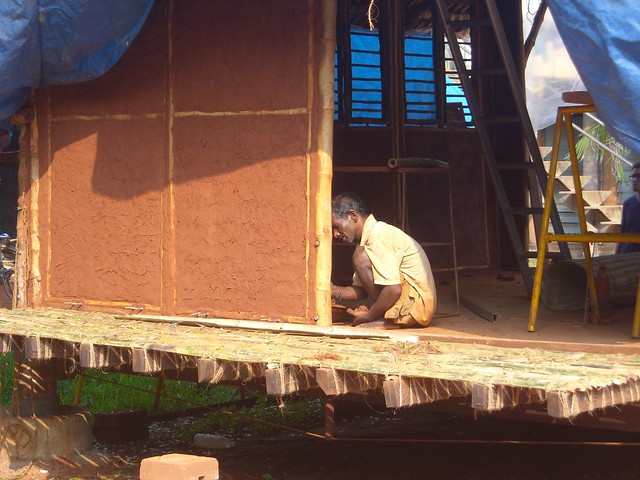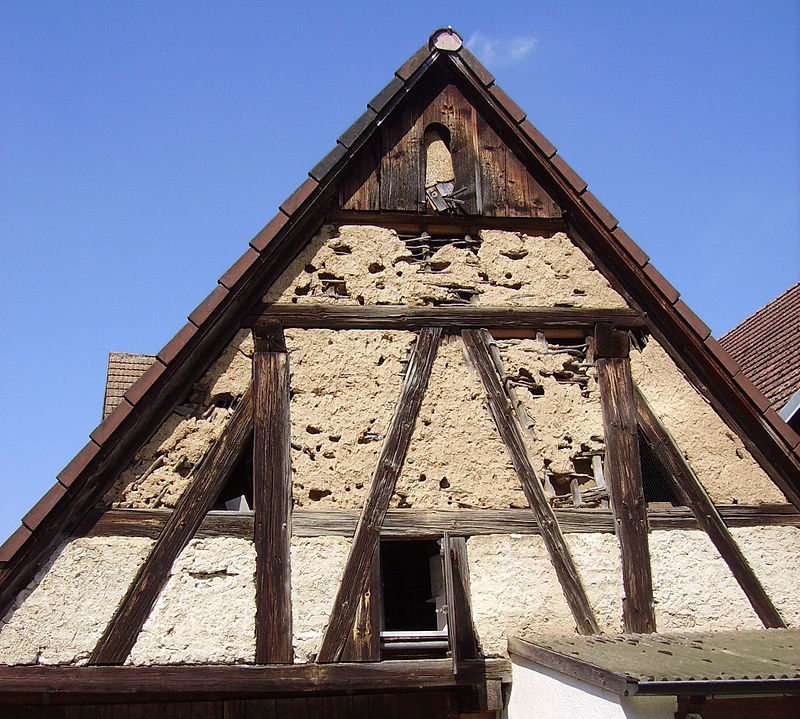THREE: JOINTS OF MUD, DAUBING AND PLASTERS
 |
| Wattle and Daub construction |
In locations where building stones or wood and grass products (bamboo,
Cain, long straws) are available, Mud has been used as joint filler, daubing,
layering or plastering material. In Himalayan range stone boulders have been
used for creating walls. These were internally and superficially packed with
mud or plastered. (Though the boulder walls, in spite of packing and joint
filling remain unstable in earthquakes -are now banned.) In stone masonry the
joint filling or external packing (lining) with mud, stops cold winds, rain-water penetration and insects proliferation.
 |
| Mud packed stone wall |
Clay daubing is mud plaster over woven mats of bamboo, grasses etc. fixed
over frames. Similarly wood, metal and other lattices are used to hold a layer
of mud. This method creates, comparatively a thinner, and so a lighter wall
structure. The framing structure provides the load-bearing capacity and
lateral stability. Often inner partitions of Mud wall houses are made by this
method.
WATTLE and DAUB is a technique of creating both, in-situ walls and pre-cast
panels that are attached to the framing of the building. It has been used since
neolithic period. A woven lattice of wooden strips called wattle is daubed on
both sides, with plastic slurry of mud. As the mass is very thin, it dries out fast
with very little cracking. The surface is re-daubed on both sides to refill the
residual cracks and achieve a smooth finish.
 |
| Daubing left out to form opening |
The mud requirements are small, so select quality mud is used. It is often
rotted with dung, vegetation waste to increase the fibre content. Other binders
mixed with the mud include lime, jaggery, gums, polymers, etc. For the second
coat, materials like chalk, talc, iron oxides are used to add whiteness or colour.
Wattle is traditionally made by weaving thin branches or thin slats between
upright stakes. The wattle made as loose panel forms in-fill plates. Nowadays
to avoid white ants attacks, stainless steel, aluminium and polyester extruded
longs and lattices are used in place of wood-based wattles.
 |
| Clay daubing thin wall |


6 comments:
Transform your space with Quartier Studio’s premium Wooden Sheets for Interior Designing, crafted to bring warmth, texture, and sophistication to every project. Whether it's wall paneling, ceilings, or custom furniture, our carefully selected wooden sheets add timeless elegance and depth to interiors. At Quartier Studio, we blend material knowledge with refined design, ensuring every element contributes to a cohesive, luxurious look. From smooth finishes to rich grains, our wooden sheets are perfect for both modern and classic spaces. Choose Quartier Studio for interiors that reflect style, quality, and individuality — where design starts with the finest materials.
Thanks for sharing these ideas about using marble in interior design.Interior stone wall cladding Ireland
Natural stone lining Dublin
Stone veneer interiors Ireland
Decorative stone panels Ireland
Limestone interior walls Ireland
Stone feature walls Ireland
Interior stone finishes Ireland
Stone wall design Cork
Rustic stone interiors Ireland
Architectural stone lining Ireland
Thanks for sharing these ideas about using marble in interior design.
interior lining stones Ireland
decorative stone cladding Dublin
natural stone wall finishes
limestone interior panels Ireland
stone veneer for interiors
Irish stone lining suppliers
stone wall cladding for homes
interior stone design ideas
rustic stone finishes Ireland
stone lining for modern interiors
Thanks for sharing these ideas about using marble in interior design. stone masonry Switzerland
decorative stonework Zurich
natural stone decoration Switzerland
custom stone masonry Geneva
architectural stone features Switzerland
stone carving and ornamentation Switzerland
limestone masonry projects Switzerland
handcrafted stone details Switzerland
traditional stone facades Switzerland
Thanks for sharing these ideas about using marble in interior design.ornamental stone carving
historic facade restoration
sandstone sculptures Germany
granite decorative elements
custom stone figures
architectural stone details
traditional stonemasonry
German craftsmanship in stone
natural stone decoration
interior and exterior stone art
Thanks for sharing these ideas about using marble in interior design.German interior design trends
natural stone wall cladding
minimalist stone aesthetics
custom stone furniture
local stone suppliers Germany
marble and granite finishes
sustainable interior materials
architectural stone elements
premium stone textures
modern living spaces Germany
Post a Comment